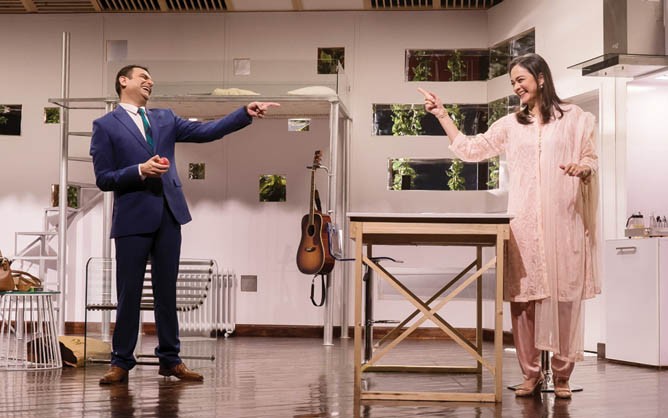
An intimate tale of the interrelationship of three individuals, Jhanjar Di Paanwaan Chhankaar is an absolute treat

Olomopolo Media’s new play, Jhanjar Di Paanwaan Chhankaar, takes its name from a famous song by Noor Jehan.
After watching the stage play at the Arts Council in Karachi on April 29, I was curious to watch on YouTube the original dance number performed by Punjabi movie star of yesteryear, Anjuman. But I was hugely disappointed. In the play the phenomenal Sarmad Khoosat outdoes Anjuman hands down by his version of the dance. He not only plays one of the two central characters but, together with his sister Kanwal Khoosat, has also directed Jhanjar Di Paanwaan Chhankaar.
The play is an adaptation of Leonard Gershe’s Butterflies Are Free. Writers Saeed Rahman and Fatima Maan deserve to be applauded as the script is completely steeped in the local idiom. The characters have various layers of personality, vulnerable and strong but also flawed, needy and with wayward tendencies. These contradictory traits push the play forward at a fast pace, creating a charming plot that is not only funny but also quite moving and heartwarming.
Before the curtain went up, all eyes were on the star-studded audience seated on the first two rows of the auditorium: Many veterans of theatre, television and film were present on the final day of the three-day performance, including Irfan Khoosat, Talat Husain, Shakeel, Samina Ahmad, Bushra Ansari, Rubina Ashraf, Durdana Butt, Shamim Hilali, Hina Bayat, Mehreen Jabbar and Mahira Khan, to name but a few.
However, once the play started (exactly on time), everyone was riveted to their seats with their eyes only for the stage for the next hour and 45 minutes.
The play opens with the handsome and well-dressed Hamza (played by Zain Afzal) moving around in his all-white, stylishly modern and meticulously kept one-room apartment which has, among other items, a hanging wicker chair, a loft bed, a dining table and a kitchenette. He is talking on the phone with his mother (Samiya Mumtaz). Suddenly the song Jhanjar Di Paanwaan Chhankaar erupts loudly from the neighbouring apartment, making it difficult for Hamza and his mother to continue their conversation.
Since the walls are paper-thin, the two neighbours then talk to each other from their separate lodgings before Zaman (Sarmad Khoosat) -- the neighbour -- invites himself over for a cup of coffee.
After a few minutes, Zaman discovers that the 28-year-old Hamza has been blind since birth but is excited to have cut the apron strings of his over-protective mother and is living on his own for the first time in his life. He wants to pursue a career in music but wants to experience a less sheltered life, away from the smothering influence of his overbearing writer-mother. Hamza is the valiant young hero of his mother Rubina’s children’s stories but she does not approve of him moving away to Lahore from their large home in Shaikhupura. Hamza lost his father some years back. Rubina feels lonely without having Hamza to look after. On the other hand, Hamza continues to remind his mother that they have made a two-month pact to let him be on his own, and she is not supposed to visit him during this period.
Zaman and Hamza hit it off almost instantly. Zaman tells him about his acting career and that he is practising to dance for a role he is playing in a movie. The role is of a man who works in a bank during the day but is obsessed with the Punjabi film heroine Anjuman and, every evening after spending the day at his mundane job, he lives out his fantasy by dressing up as a woman and dancing ala Anjuman. Hamza invites him to practice the dance in his apartment, which is much bigger and nicer. Zaman makes a brief exit and then re-enters wearing high heels, golden anklets and a net dupatta!
This is when we get to watch Sarmad dancing with wild abandon, cracking the ribs of the audience in the packed auditorium as they go into peals of laughter.
However, midway into the play, Rubina enters unannounced. She is horrified to see the flamboyant Zaman and to realise that her son is awed by him and under Zaman’s influence. Her controlling instincts go into overdrive, with varying results. At this point Iman Shahid makes a brief appearance as the director of Zaman’s film and has a tête-à-tête with Rubina.
Towards the end, Zaman leaves the apartment with his bags to move in with Iman, leaving Hamza more than a little furious. He trips over the furniture and falls flat on the floor. But Zaman soon returns, and the play ends with the hope of a continued friendship.
The actors have all done a remarkable job. The play is an intimate tale of the interrelationship of the three individuals, all of whom gain from each other. It carries a powerful message about the worldview of the emotionally crippled against that of the physically disabled, who may be quite independent. It is about personality flaws, their tolerance and acceptability, and also about a parent’s excessive love encroaching on a grown child’s freedom. It breaks many stereotypes. It is a treat!